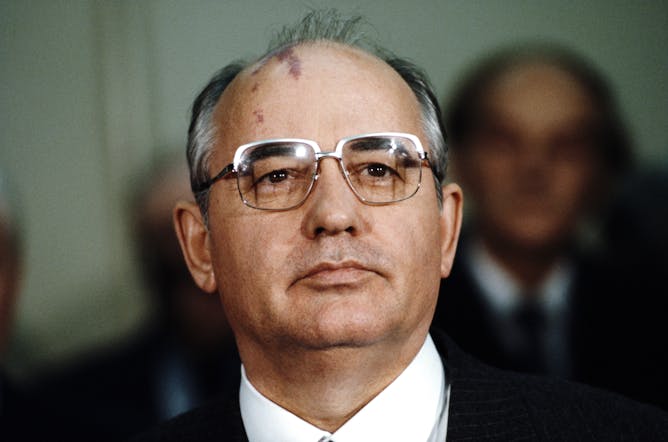|
|
|
|
The country once known as the Union of Soviet Socialist Republics, or the Soviet Union, was profoundly changed by leader Mikhail Gorbachev, who died on Aug. 30, 2022.
Before Gorbachev, it was a vast, powerful, sprawling Communist power. Then he arrived with ambitions to be “a reformer…a revolutionary from above, wanting to liberalize and democratize his country to save socialism,” writes University of Michigan historian and political scientist Ronald Suny.
Suny is a specialist in the history of imperial Russia and the USSR. In his appreciation of Gorbachev, he paints a picture of an almost tragic figure, whose attempts to bring more freedom and openness to his country were ultimately undermined and undone by forces he didn’t anticipate.
“Much of the blame for the failure of the reforms falls on Gorbachev, who tried to do too much, too fast without the resources to achieve his goals,” writes Suny.
Also today:
|

|
Matt Williams
Senior Breaking News and International Editor
|
|

Liberator, failed reformer or architect of Soviet demise?
Bryn Colton/Getty Images
Ronald Suny, University of Michigan
Mikhail Gorbachev died at 91 on Aug. 30, 2022. A historian of the Soviet era assesses his impact and the consequences of his failed attempts to reform state socialism.
|
Arts + Culture
|
-
Erin Whiteside, University of Tennessee
There is no understating the impact Williams has had on the game itself. But her role in helping sports journalists reimagine the scope of their work is a key part of her enduring legacy.
|
|
Economy + Business
|
-
Ho-Yin Mak, Georgetown University; Christopher S. Tang, University of California, Los Angeles; Tinglong Dai, Johns Hopkins University
China controls much of the global EV supply chain, but electric vehicles that use its parts and minerals won’t qualify for new US EV tax credits. Can America build its own supply chain?
|
|
Politics + Society
|
-
Wolf Gruner, USC Dornsife College of Letters, Arts and Sciences
Holocaust scholars long relied on documents and survivor testimonies to help reconstruct the history of that tragic event. Now, they’re turning to wordless witnesses to learn more: pictures.
-
Briana Mawby, University of San Diego
While Russia and Ukraine’s war wages on, previous peace talk discussions didn’t appear to include women. Changing that can make a difference, research shows.
-
Thessalia Merivaki, Mississippi State University; Mara Suttmann-Lea, Connecticut College
When election officials share voting information on social media, voters benefit – and so does democracy.
|
|
Ethics + Religion
|
-
Marie-Claire Beaulieu, Tufts University
A scholar of Greek mythology explains the naming of NASA’s missions after mythological figures and why the name Artemis is indicative of a more diverse era of space exploration.
-
Joanne M. Pierce, College of the Holy Cross
Popes’ roles have changed over time. Some periods produced plenty of saintly popes, while others are notorious for the opposite.
|
|
Science + Technology
|
-
Agnès Lacreuse, UMass Amherst; Allyson J. Bennett, University of Wisconsin-Madison; Amanda M. Dettmer, Yale University
Nonhuman primates like rhesus monkeys share certain characteristics with people that may make them better study subjects than mice for research on neurodegenerative diseases.
|
|
Health + Medicine
|
-
Lauren Ralph, University of California, San Francisco
The fall of Roe v. Wade will result in more people deciding to privately end a pregnancy, a new study finds. But how often people will turn to safe versus unsafe options remains to be seen.
|
|
|
|
|
|
| |
| |
| |
| |
|
|
|
|
|
|
|